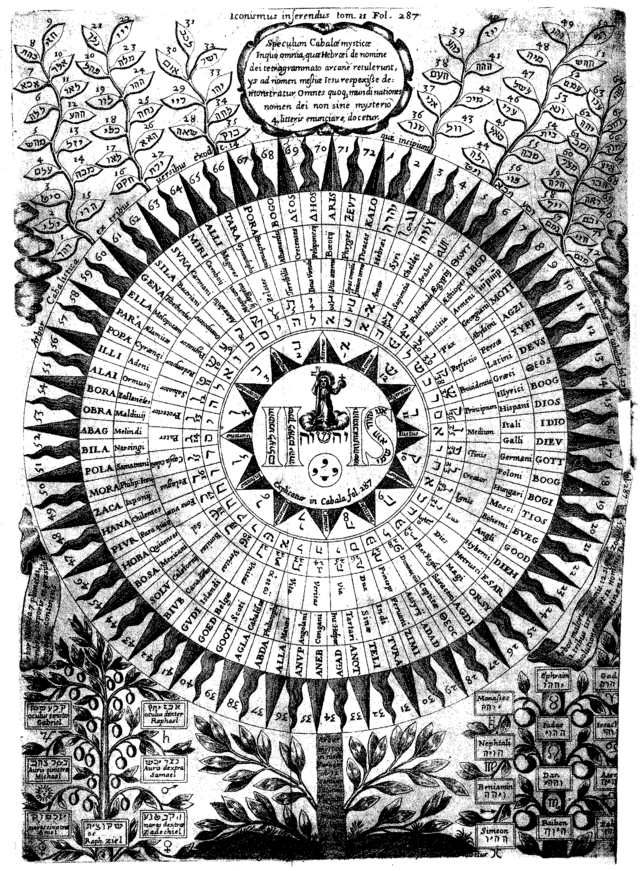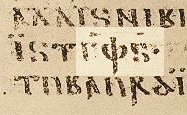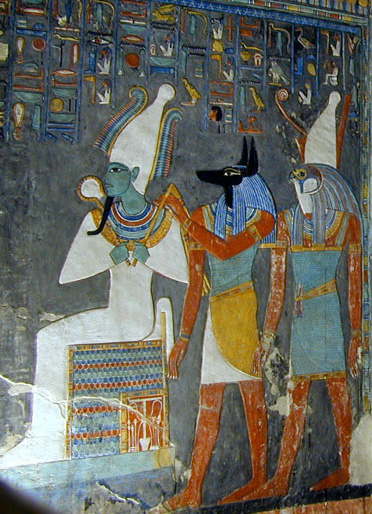|
Theonym
A theonym (from Greek (), 'god', attached to (), ) is a proper name of a deity. Theonymy, the study of divine proper names, is a branch of onomastics, the study of the etymology, history, and use of proper names. Theonymy helps develop an understanding of the function and societal views of particular gods and may help understand the origins of a society's language. Analysis of theonyms has been useful in understanding the connections of Indo-European languages and possibly their religion. In all languages, the analysis of the possible etymological origin of a theonym can serve as basis for theories of its historical origin. Metaphysical and mystical meanings are also discerned in theonyms, as in Kabbalah. Theonyms can also appear as all or part of a name for a human, animal, plant, thing or place. See also * -onym * Theo * Theology * Thealogy, similar origin as above, but female instead * God (word) * Names of God * Nomenclature * Onomastics Onomastics (or onomatolog ... [...More Info...] [...Related Items...] OR: [Wikipedia] [Google] [Baidu] |
Indo-European Religion
Proto-Indo-European mythology is the body of myths and deities associated with the Proto-Indo-Europeans, speakers of the hypothesized Proto-Indo-European language. Although the mythological motifs are not directly attested – since Proto-Indo-European speakers lived in preliterate societies – scholars of comparative mythology have reconstructed details from inherited similarities in mythological concepts found in Indo-European languages, based on the assumption that parts of the Proto-Indo-Europeans' original belief systems survived in the daughter traditions. The Proto-Indo-European pantheon includes a number of securely reconstructed deities, since they are both cognates—linguistic siblings from a common origin—and associated with similar attributes and body of myths: such as , the daylight-sky god; his consort , the earth mother; his daughter , the dawn goddess; his sons the Divine Twins; and and , a solar deity and moon deity, respectively. Some deities, like ... [...More Info...] [...Related Items...] OR: [Wikipedia] [Google] [Baidu] |
-onym
The suffix ''-onym'' (from ) is a bound morpheme, that is attached to the end of a root word, thus forming a new compound word that designates a particular ''class'' of names. In linguistic terminology, compound words that are formed with suffix ''-onym'' are most commonly used as designations for various onomastic classes. Most onomastic terms that are formed with suffix ''-onym'' are classical compounds, whose word roots are taken from classical languages (Greek and Latin). For example, onomastic terms like toponym and linguonym are typical classical (or neoclassical) compounds, formed from suffix ''-onym'' and classical (Greek and Latin) root words ( / place; / language). In some compounds, the ''-onym'' morpheme has been modified by replacing (or dropping) the "o". In the compounds like '' ananym'' and '' metanym'', the correct forms ('' anonym'' and ''metonym'') were pre-occupied by other meanings. Other, late 20th century examples, such as ''hypernym'' and '' charactern ... [...More Info...] [...Related Items...] OR: [Wikipedia] [Google] [Baidu] |
Names Of God
There are various names of God, many of which enumerate the various Quality (philosophy), qualities of a Supreme Being. The English word ''God (word), god'' (and its equivalent in other languages) is used by multiple religions as a noun to refer to different deities, or specifically to the Supreme Being, as denoted in English by the capitalized and uncapitalized terms ''God'' and ''deity, god''. Ancient cognate equivalents for the biblical Hebrew ''Elohim'', one of the most common Names of God in Judaism, names of God in the Bible, include Proto-Semitic language, proto-Semitic ''El (deity), El'', biblical Aramaic ''Names of God in Judaism#Elah, Elah'', and Arabic ''ilah''. The personal or proper name for God in many of these languages may either be distinguished from such property (philosophy), attributes, or homonymic. For example, in Judaism the tetragrammaton is sometimes related to the ancient Hebrew ''Names of God in Judaism#Ehyeh, ehyeh'' ("I Am that I Am, I will be"). It ... [...More Info...] [...Related Items...] OR: [Wikipedia] [Google] [Baidu] |
Greek Language
Greek (, ; , ) is an Indo-European languages, Indo-European language, constituting an independent Hellenic languages, Hellenic branch within the Indo-European language family. It is native to Greece, Cyprus, Italy (in Calabria and Salento), southern Albania, and other regions of the Balkans, Caucasus, the Black Sea coast, Asia Minor, and the Eastern Mediterranean. It has the list of languages by first written accounts, longest documented history of any Indo-European language, spanning at least 3,400 years of written records. Its writing system is the Greek alphabet, which has been used for approximately 2,800 years; previously, Greek was recorded in writing systems such as Linear B and the Cypriot syllabary. The Greek language holds a very important place in the history of the Western world. Beginning with the epics of Homer, ancient Greek literature includes many works of lasting importance in the European canon. Greek is also the language in which many of the foundational texts ... [...More Info...] [...Related Items...] OR: [Wikipedia] [Google] [Baidu] |
God (word)
The English word ''god'' comes from the Old English , which itself is derived from the Proto-Germanic . Its cognates in other Germanic languages include (both Gothic), (Old Norse), (Old Saxon, Old Frisian, and Old Dutch), and (Old High German). Etymology The Proto-Germanic meaning of and its etymology is uncertain. It is generally agreed that it derives from a Proto-Indo-European neuter passive perfect participle '. Depending on which possibility is preferred, the pre-Christian meaning of the Germanic term may either have been (in the "pouring" case) "libation" or "that which is libated upon, idol" — or, as Watkins opines in the light of Greek "poured earth" meaning "tumulus", "the Germanic form may have referred in the first instance to the spirit immanent in a burial mound" — or (in the "invoke" case) "invocation, prayer" (compare the meanings of Sanskrit ') or "that which is invoked." The term "Godan" was the name used for Wodan ( Odin ) amongst ... [...More Info...] [...Related Items...] OR: [Wikipedia] [Google] [Baidu] |
Deities
A deity or god is a supernatural being considered to be sacred and worthy of worship due to having authority over some aspect of the universe and/or life. The ''Oxford Dictionary of English'' defines ''deity'' as a God (male deity), god or goddess, or anything revered as divine. C. Scott Littleton defines a deity as "a being with powers greater than those of ordinary humans, but who interacts with humans, positively or negatively, in ways that carry humans to new Higher consciousness, levels of consciousness, beyond the grounded preoccupations of ordinary life". Religions can be categorized by how many deities they worship. Monotheism, Monotheistic religions accept only one deity (predominantly referred to as "God"), whereas Polytheism, polytheistic religions accept multiple deities. Henotheism, Henotheistic religions accept one God, supreme deity without denying other deities, considering them as aspects of the same divine principle. Nontheistic religions deny any supreme eter ... [...More Info...] [...Related Items...] OR: [Wikipedia] [Google] [Baidu] |
Theophoric Name
A theophoric name (from Greek: , ''theophoros'', literally "bearing or carrying a god") embeds the word equivalent of 'god' or a god's name in a person's name, reflecting something about the character of the person so named in relation to that deity. For example, names embedding Apollo, such as ''Apollonios'' or ''Apollodorus'', existed in Greek antiquity. Theophoric personal names, containing the name of a god in whose care the individual is entrusted (or a generic word for ''god''), were also exceedingly common in the ancient Near East and Mesopotamia Mesopotamia is a historical region of West Asia situated within the Tigris–Euphrates river system, in the northern part of the Fertile Crescent. Today, Mesopotamia is known as present-day Iraq and forms the eastern geographic boundary of .... Some names of theophoric origin remain common today, such as Theodore (given name), Theodore (''theo-'', "god"; ''-dore'', origin of word compound in Greek: ''doron'', "gift"; he ... [...More Info...] [...Related Items...] OR: [Wikipedia] [Google] [Baidu] |
Onomastics
Onomastics (or onomatology in older texts) is the study of proper names, including their etymology, history, and use. An ''alethonym'' ('true name') or an ''orthonym'' ('real name') is the proper name of the object in question, the object of onomastic study. Scholars studying onomastics are called ''onomasticians''. Onomastics has applications in data mining, with applications such as named-entity recognition, or recognition of the origin of names. It is a popular approach in historical research, where it can be used to identify ethnic minorities within populations and for the purpose of prosopography. Etymology ''Onomastics'' originates from the Greek (), itself derived from (). Branches * Toponymy Toponymy, toponymics, or toponomastics is the study of '' toponyms'' ( proper names of places, also known as place names and geographic names), including their origins, meanings, usage, and types. ''Toponym'' is the general term for a proper na ... (or more precisely to ... [...More Info...] [...Related Items...] OR: [Wikipedia] [Google] [Baidu] |
Nomenclature
Nomenclature (, ) is a system of names or terms, or the rules for forming these terms in a particular field of arts or sciences. (The theoretical field studying nomenclature is sometimes referred to as ''onymology'' or ''taxonymy'' ). The principles of naming vary from the relatively informal conventions of everyday speech to the internationally agreed principles, rules, and recommendations that govern the formation and use of the specialist terminology used in scientific and any other disciplines. Naming "things" is a part of general human communication using words and language: it is an aspect of everyday taxonomy as people distinguish the objects of their experience, together with their similarities and differences, which observers identify, name and classify. The use of names, as the many different kinds of nouns embedded in different languages, connects nomenclature to theoretical linguistics, while the way humans mentally structure the world in relation to word meanings a ... [...More Info...] [...Related Items...] OR: [Wikipedia] [Google] [Baidu] |
Theology
Theology is the study of religious belief from a Religion, religious perspective, with a focus on the nature of divinity. It is taught as an Discipline (academia), academic discipline, typically in universities and seminaries. It occupies itself with the unique content of analyzing the supernatural, but also deals with religious epistemology, asks and seeks to answer the question of revelation. Revelation pertains to the acceptance of God, gods, or deity, deities, as not only transcendent or above the natural world, but also willing and able to interact with the natural world and to reveal themselves to humankind. Theologians use various forms of analysis and argument (Spirituality, experiential, philosophy, philosophical, ethnography, ethnographic, history, historical, and others) to help understanding, understand, explanation, explain, test, critique, defend or promote any myriad of List of religious topics, religious topics. As in philosophy of ethics and case law, arguments ... [...More Info...] [...Related Items...] OR: [Wikipedia] [Google] [Baidu] |
Thealogy
Thealogy views divine matters through feminine perspectives including but not limited to feminism. Valerie Saiving, Isaac Bonewits (1976) and Naomi Goldenberg (1979) introduced the concept as a neologism (new word). Its use then widened to mean all feminine ideas of the sacred, which Charlotte Caron usefully explained in 1993: "reflection on the divine in feminine or feminist terms". By 1996, when Melissa Raphael published ''Thealogy and Embodiment'', the term was well established. As a neologism, the term derives from two Greek words: , , meaning 'goddess', the feminine equivalent of , 'god' (from PIE root ); and , , plural , often found in English as the suffix '' -logy'', meaning 'word, reason, plan'; and in Greek philosophy and theology, the divine reason implicit in the cosmos. Thealogy has areas in common with feminist theology – the study of God from a feminist perspective, often emphasizing monotheism. The relation is an overlap, as thealogy is not limited to on ... [...More Info...] [...Related Items...] OR: [Wikipedia] [Google] [Baidu] |
Deity
A deity or god is a supernatural being considered to be sacred and worthy of worship due to having authority over some aspect of the universe and/or life. The ''Oxford Dictionary of English'' defines ''deity'' as a God (male deity), god or goddess, or anything revered as divine. C. Scott Littleton defines a deity as "a being with powers greater than those of ordinary humans, but who interacts with humans, positively or negatively, in ways that carry humans to new Higher consciousness, levels of consciousness, beyond the grounded preoccupations of ordinary life". Religions can be categorized by how many deities they worship. Monotheism, Monotheistic religions accept only one deity (predominantly referred to as "God"), whereas Polytheism, polytheistic religions accept multiple deities. Henotheism, Henotheistic religions accept one God, supreme deity without denying other deities, considering them as aspects of the same divine principle. Nontheistic religions deny any supreme eter ... [...More Info...] [...Related Items...] OR: [Wikipedia] [Google] [Baidu] |







